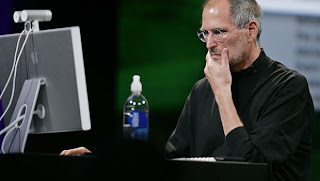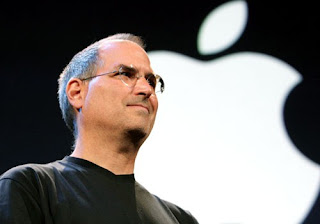Steve Jobs Has Seen The Digital Future, The World Was Followed By
Steve Jobs Has Seen The Digital Future, The World Was Followed By
Steve Jobs Has Seen The Digital Future, The World Was Followed By
Steve Jobs Has Seen The Digital Future, The World Was Followed By
(CBS / AP) SAN FRANCISCO - Steve Jobs has seen the future and brought the world to her. Technology moved garages pockets, entertainment took bytes discs and became extensions of those gadgets that use them.
Jobs, who founded and ran Apple, told us what we needed before we wanted to.
"For some people this is like Elvis Presley or John Lennon. It will change in our time. And 'the end of an era," said Scott Robbins, 34, a barber and a fan of Apple. "It 's like the end of the innovators."
Apple cofounder Steve Jobs, who died at 56
What are the prospects of Apple Steve Jobs after death '?
Comment: Steve Jobs, the different thought
Apple has announced his death without giving a specific reason. He died peacefully on Wednesday, in the opinion of family members who were present. He was 56
"Steve brilliance, passion and energy were the source of many innovations that enrich and improve our lives," said Apple's board in a statement. "The world is infinitely better because of Steve."
President Barack Obama said in a statement that the work, "an example of the spirit of ingenuity American."
World reacts through Steve Jobs'
Pancreatic cancer death in the eyes of Steve Jobs
"Steve was one of the greatest innovators of Americans - have the courage to think differently, courage to believe that you can change the world, and so much talent to do it," he said.
Jobs had battled cancer in 2004 and was a liver transplant in 2009 after taking a leave of absence for an indefinite period of health problems. He took another leave of absence in January - the third since his health problems began - and resigned in August. Jobs became Apple chairman and handed the job to his handpicked successor, managing director, Tim Cook.
Outside Apple's Cupertino headquarters of the three flags - the American flag, the flag of the State of California and the Apple flag - flown half staff late Wednesday.
"Those of us who have had the good fortune to meet Steve and have lost a dear friend and inspiring teacher." Cook wrote in an e-mail from Apple employees. "Steve leaves behind a company that only he could have accomplished, and his life forever founding of Apple."
News of Apple fans and investors were afraid of was the day after Apple announced its latest iPhone, the device, which received a lukewarm reception. Perhaps it would be more enthusiasm was already in a job well enough to show off with his trademark theatrics.
Jobs started Apple with a friend from high school in Silicon Valley garage in 1976, was forced to leave ten years later and returned in 1997 to save the company. During his second stint, has grown into the most valuable technology company in the world with a market value of $ 351 billion. Almost all goods were created by the return of Labour '.
"60 Minutes" interviews Steve Jobs
Growing Apple counter-culture and ethical sensitivity of the minimalist design, Jobs is a sensational release a product after another in the face of recession in late 2000, and not his own health.
He helped change the computer geek obsessed fans in need of a modern life at work and at home, and in the process, not only revolutionized the personal technology, but the mobile phone and music industries.
For the transformation of American industry, which has few rivals. For a long time been associated with the era of personal computers today, Bill Gates, and made comparisons with other creative geniuses such as Walt Disney. Jobs is the largest shareholder of Walt Disney Co. 'dead' s, a byproduct of their decision to sell the studio Pixar animation team in 2006.
Perhaps the most influential, Jobs launched the iPod in 2001, which offered "1,000 songs in your pocket." Over the next 10 years, his white headphones and the thumb-wheel control seemed even more ubiquitous as wristwatches.
In 2007 came the iPhone touchscreen, joined a year later by Apple App Store, where developers can sell iPhone "apps" that made the phone a device not only to make calls, but also to manage money, photo editing, gaming and social networking. And in 2010, Jobs introduced the iPhone, tablet size, all equipment with touch screen, which took off while market analysts said that no one really needs it.
In 2011, Apple became the second largest company of any kind in the United States by market value. In August, he briefly surpassed Exxon Mobil as the most valuable company.
He went to another sick leave in January 2011, this time indefinitely. He never returned and stepped down as CEO in August, but remained as chairman. According to his taste for secrecy, he made no reference to his illness in his resignation letter.
Steven Paul Jobs was born February 24, 1955, in San Francisco Joanne Simpson, as single students and graduates Abdulfattah Jandal, a student from Syria. Jobs Simpson gave up for adoption, but she married Jandal and some years later had another child with him, Mona Simpson, who became a novelist.
Steven was adopted by Paul and Clara Jobs in Los Altos, California, a couple of the working class that nurtured his early interest in electronics. He saw his first computer at Ames Research Center NASA when I was about 11 and got a summer job at Hewlett-Packard before completing high school.
Careers enrolled in Reed College in Portland, Oregon in 1972, but dropped out after six months.
"All my savings of the working class parents were spent on my college tuition. After six months, I could not see the value in it, "he said in a speech at Stanford University in early 2005. "I had no idea what I wanted to do with my life and no idea how the university could help me understand."
Video: Steve Jobs retrospective
Video: The charisma of Steve Jobs: Mac From the IPAD
When he returned to California in 1974, Jobs worked for Atari video game maker, and participated in meetings of the Homebrew Computer Club - a group of computer enthusiasts - with Steve Wozniak, a high school friend who was a little older.
Home team Wozniak has attracted the attention of fans, but given its potential for use beyond the geek fans of the era. The couple began to Apple Computer Inc. in the garage job of parents "in 1976. According to Wozniak, Jobs suggested the name after visiting a" garden "Wozniak said it was actually a set.
"It 'was incredible fortune of partnership, but he talked a lot about life and passion for life and energy to do things. Steve and I, almost every day, talking about where life was going to people, what was important, what is right and what was good, "Wozniak remembered" Early Show "on Thursday.
Their first creation was the Apple I - mostly without the courage of your computer case, keyboard or monitor.
Apple II, which hit the market in 1977 was their first machine for the masses. It became so popular that Jobs has a value of $ 100 million in 25 years.
During a 1979 visit to the Xerox Palo Alto Research Center, Jobs was once again the ground potential in a niche of invention: a team that allowed people to control computers with one mouse click, not type commands. He returned to Apple and ordered his engineering team to copy what he saw.
It foreshadowed a tendency to take other concepts, improve, and they spin very successful products. Under Jobs, Apple did not invent computers, digital music players or smartphones - has renewed one of those people who do not want to learn to program computers or to negotiate the technical difficulties keeping their gadgets work.
"We have always been shameless to steal the great ideas," Jobs said in an interview in the 1996 PBS series "Triumph of the Nerds."




















0 comments:
Post a Comment